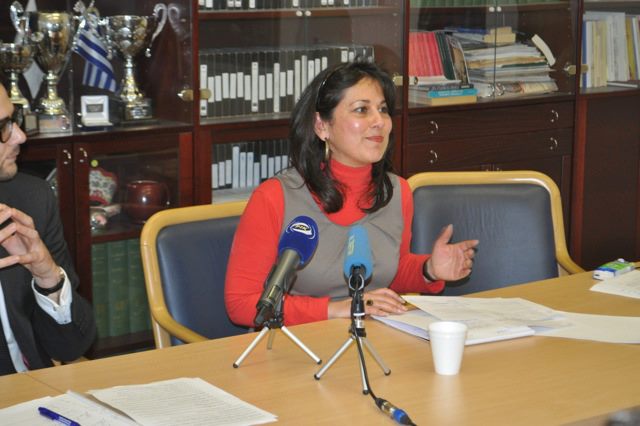In a world of 24/7 rolling news and a constant demand for multimedia content, how do you make sure the human story is not forgotten? On Wednesday 5th February 2014, Emma and I attended a One World Media workshop run by experienced journalist and war correspondent Anna Averkiou at Falmouth University. The workshop focused on reporting and filmmaking in challenging environments and how to engage your target audiences with impactful stories that stand out from the crowd.

Over the course of the event, Anna shared knowledge gained from over 25 years’ experience working as a journalist with various national and international news organisations, including the BBC and CNN. Specialising in global news, she covered some of the world’s biggest stories including Bosnia and the Middle East.
Examples of news journalism and current affairs reporting were scrutinized in terms of style, format, audience and impact. Participants were invited to respond critically to news and documentary clips from Palestine, Haiti, Afghanistan, Pakistan, Algeria, Nigeria and Ghana. Following open dialogue sessions, Anna gave many lessons and insights from time spent working in the field.
As participants we were set to work on exercises designed to see how we would behave when confronted with dilemmas routinely faced by journalists working in challenging environments. Controversial subjects tackled included paying for stories, responsibility for the wellbeing of sources and a range of other ethical dilemmas. Personal safety and looking after your health were also covered.
The centrality of some advice for any journalist working in conflict environments was clear. Much of it was equally relevant for those of us helping others to communicate their stories:
-
Don’t treat people as curiosities, give them a voice and focus on telling their stories rather than the issue at large
-
Work out what angles you are going to take to ensure people’s stories speak through your journalism
-
Don’t become the story unless it is your conscious decision from the start
-
Report don’t judge
-
Keep a clean nose and try to maintain your neutrality
-
Be sure to highlight and show your context
-
It’s about making your stories relevant to your target audience
-
Think about the impact!
-
Find the person, find the topic and find the link to help tell the story.
We gained lots of valuable and sometimes counter-intuitive knowledge throughout the day. The message that stories, not issues, lie at the heart of audience engagement is well worth further discussion across the development community as it has a bearing on all forms of communication. As communications practitioners we should always be thinking about narrative and storytelling when seeking to influence and engage our audiences.
The One World Media Education Programme is the UK partner of a pan-European project
called Beyond Your World (http://www.beyondyourworld.eu).The project seeks to inspire and enable young journalists and filmmakers to cover international development issues. For more information visit: http://oneworldmedia.org.uk/education
Funding opportunities are also available. Students that have participated in the workshop can apply for financial support to help them cover stories in the developing world as part of their course. For more information visit: http://oneworldmedia.org.uk/production-fund

Leave a Reply